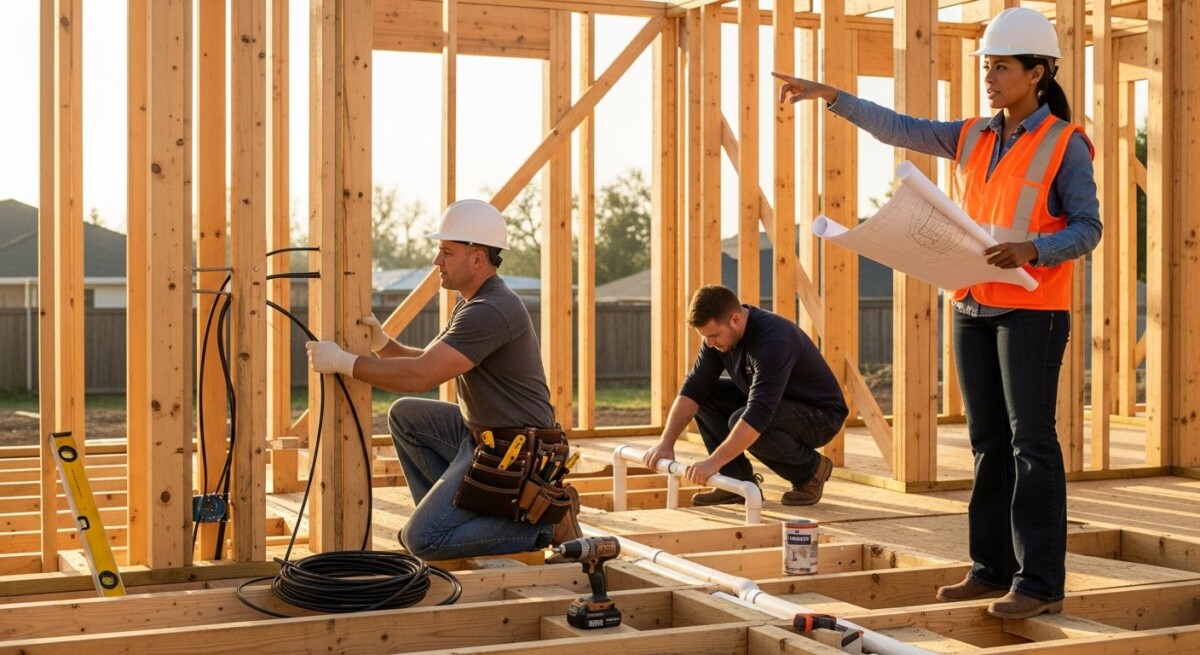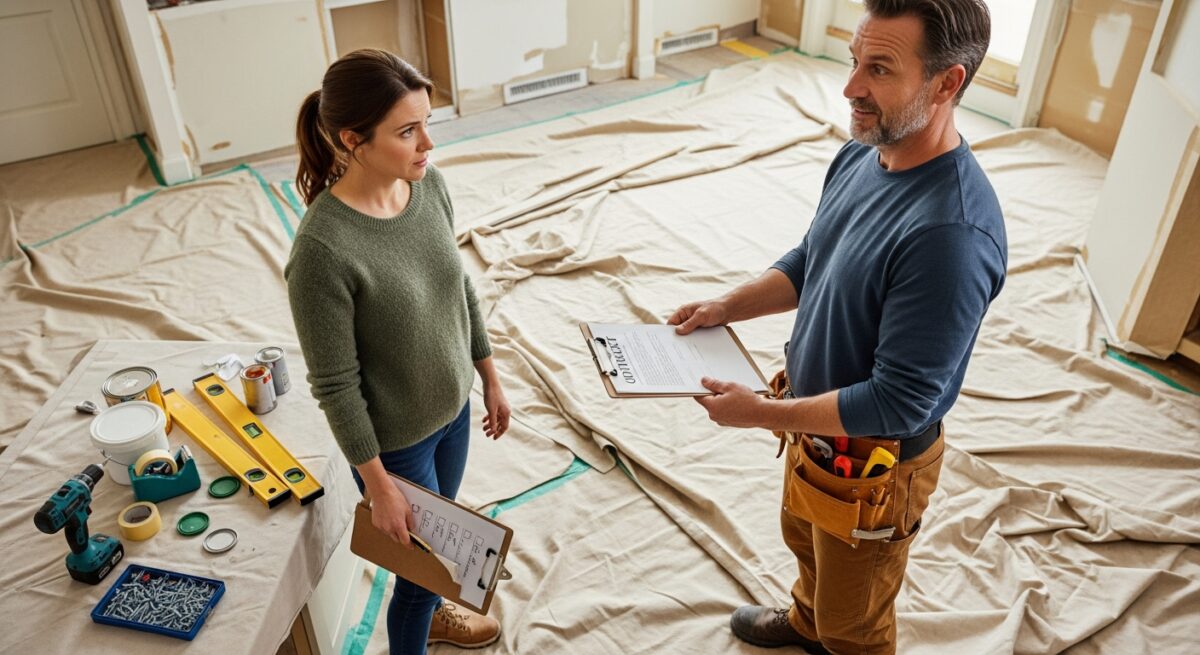West Virginia’s Best Home Builders: Turning Visions Into Reality
Nestled in the heart of the Appalachian region, West Virginia is a state known for its stunning natural landscapes and warm, welcoming communities. Whether you’re dreaming of a rustic cabin in the mountains, a modern home in a suburban neighborhood, or a custom-built retreat overlooking the rolling hills, West Virginia’s best home builders have the expertise to make your vision a reality.
Ready to build your dream home? Contact West Virginia’s top home builders today for a consultation.
Building a home in West Virginia is about more than creating a structure; it’s about crafting a space that reflects your lifestyle while embracing the state’s natural beauty and architectural traditions. With a focus on quality craftsmanship, sustainability, and innovation, professional builders ensure that every home is designed to inspire and endure.
This guide explores the benefits of working with professional home builders, the latest trends in West Virginia’s home designs, and key tips to navigate the building process smoothly.
Why Choose Professional Home Builders in West Virginia?
Building a home is one of the most significant investments you’ll make, and partnering with experienced builders ensures exceptional results. Here’s why:
- Custom Solutions: Professional builders create homes tailored to your lifestyle, preferences, and family needs. From layout to finishes, every detail is personalized to align with your vision.
- Local Expertise: Builders in West Virginia understand the region’s terrain, weather, and local building codes, ensuring your home is both functional and compliant. Their experience helps navigate challenges like rocky soil and uneven land.
- Quality Construction: Professionals use durable materials and advanced techniques to deliver homes that stand the test of time, blending beauty with resilience.
- Eco-Friendly Practices: Many builders integrate energy-efficient systems and sustainable materials to reduce environmental impact and lower utility costs. Features like solar panels, advanced insulation, and energy-efficient windows are becoming standard.
- Streamlined Process: From securing permits to coordinating subcontractors, builders manage every aspect of the project, saving you time and stress. Their organized approach ensures projects are completed on schedule and within budget.
By choosing experienced builders, you gain access to innovative designs, expert project management, and a seamless construction experience that brings your dream home to life.
Popular Home Building Trends in West Virginia
West Virginia homeowners are embracing a variety of home building trends that blend traditional Appalachian charm with modern innovations. These trends cater to the state’s unique geography, climate, and cultural heritage while focusing on functionality, sustainability, and style. Here’s a closer look at what’s shaping the housing market in the Mountain State:
Rustic Mountain Designs
West Virginia’s picturesque landscapes inspire homes that harmonize with their natural surroundings.
- Architectural Features: Exposed wood beams, stone fireplaces, and vaulted ceilings are staples of rustic mountain designs. These elements create a warm, inviting ambiance that reflects the region’s character.
- Large Windows: Floor-to-ceiling windows and sliding glass doors provide breathtaking views of West Virginia’s rolling hills and forests while maximizing natural light.
- Outdoor Elements: Wraparound porches, decks, and natural stone exteriors enhance the rustic aesthetic while offering plenty of outdoor living opportunities.
- Material Choices: Builders use locally sourced materials like timber and stone to create an authentic connection to the environment.
Rustic mountain homes are ideal for homeowners seeking timeless designs that celebrate the state’s natural beauty.
Energy-Efficient Homes
Sustainability is becoming a priority for homeowners in West Virginia, leading to a surge in energy-efficient designs.
- Eco-Friendly Systems: High-performance insulation, energy-efficient HVAC systems, and solar panels reduce utility costs and environmental impact.
- Smart Technologies: Programmable thermostats, automated lighting, and energy monitoring systems optimize energy use and convenience.
- Sustainable Materials: Builders incorporate eco-friendly options like reclaimed wood, recycled metal roofing, and low-VOC paints.
- Water Conservation: Rainwater harvesting systems and drought-resistant landscaping are becoming more common to support sustainable water usage.
Energy-efficient homes not only lower monthly expenses but also align with environmentally conscious values.
Outdoor Living Spaces
With its stunning natural scenery, West Virginia is an ideal setting for homes with expansive outdoor living areas.
- Functional Features: Decks, patios, and screened porches provide versatile spaces for relaxation and entertainment.
- Luxury Additions: Outdoor kitchens, fire pits, and hot tubs add a touch of luxury while enhancing functionality.
- Native Landscaping: Incorporating native plants, wildflowers, and trees creates low-maintenance, eco-friendly landscapes that thrive in the local climate.
- Seasonal Enjoyment: Outdoor heaters, retractable awnings, and pergolas make these spaces usable throughout the year.
Homeowners prioritize outdoor living spaces to fully enjoy West Virginia’s four-season appeal.
Open Concept Living
Open concept designs continue to dominate home building trends for their modern appeal and practicality.
- Integrated Spaces: Seamlessly combining kitchens, dining areas, and living rooms fosters a sense of togetherness and makes entertaining easier.
- Aesthetic Enhancements: Natural finishes like hardwood floors, stone accents, and neutral color palettes elevate the aesthetic. Vaulted ceilings and large windows enhance the sense of space and light.
- Multi-Use Rooms: Flexible spaces, such as home offices, playrooms, or guest bedrooms, add adaptability to open layouts, making them suitable for changing family needs.
- Smart Integration: Builders often incorporate smart technology to connect lighting, temperature control, and appliances for greater convenience.
This trend aligns with modern lifestyles by promoting connectivity and maximizing functionality.
Accessible Designs
The demand for aging-in-place solutions and universally accessible homes is on the rise.
- Practical Features: Wide doorways, zero-step entryways, and walk-in showers ensure that homes are comfortable for people of all ages and abilities.
- First-Floor Living: Master suites and primary living areas on the ground floor accommodate accessibility needs and future planning.
- Smart Accessibility: Voice-activated controls, automated door systems, and wheelchair-friendly layouts integrate modern technology to enhance convenience.
- Discreet Design: Accessible features are seamlessly blended into the overall design, ensuring functionality without compromising aesthetics.
Accessible homes provide peace of mind for families planning for long-term living solutions.
Blending Traditional and Contemporary Styles
Many West Virginia homeowners are opting for designs that balance traditional charm with modern touches.
- Classic Meets Modern: Homes combine elements like gabled roofs and front porches with sleek interiors and minimalist finishes.
- Hybrid Materials: Builders mix traditional materials, like brick and wood, with modern ones like glass and steel to create unique, transitional designs.
- Timeless Color Palettes: Neutral tones like whites, grays, and earth tones dominate interiors, with pops of color to add personality.
This trend appeals to homeowners seeking a balance between timeless elegance and contemporary comfort.
West Virginia’s home building trends reflect a deep respect for the state’s natural beauty, cultural heritage, and practical needs. Whether incorporating sustainable practices, maximizing outdoor living, or blending traditional and modern styles, these trends ensure that homes are both functional and visually stunning. Homeowners are increasingly choosing designs that enhance their connection to the land while embracing innovative solutions for a comfortable and stylish lifestyle.
Discover how these trends can be incorporated into your custom home. Contact us for design inspiration and expert guidance.
Key Areas for Home Building in West Virginia
West Virginia offers diverse locations to build your dream home. Here are some of the top regions:
-
Charleston:
- The state capital combines urban amenities with a small-town feel. Builders often focus on modern homes with energy-efficient designs and proximity to cultural attractions.
- Zip codes: 25301, 25302, 25303.
-
Morgantown:
- Home to West Virginia University, Morgantown attracts families and professionals. Custom homes here often include contemporary designs, smart home features, and proximity to recreational facilities.
- Zip codes: 26501, 26505, 26508.
-
Harpers Ferry:
- Known for its historical charm, Harpers Ferry is perfect for those seeking a blend of colonial architecture and modern comfort. Builders preserve the area’s rich history while incorporating modern amenities.
- Zip codes: 25425.
-
Huntington:
- This vibrant city offers opportunities for suburban and urban home designs. Builders in Huntington often emphasize functionality and style, creating homes with spacious layouts and energy-efficient features.
- Zip codes: 25701, 25702, 25703.
-
Beckley:
- Surrounded by scenic beauty, Beckley is ideal for rustic retreats and custom-built family homes. Builders focus on integrating homes with the natural landscape.
- Zip codes: 25801, 25802.
Benefits of Building a Custom Home in West Virginia
Building a custom home offers numerous advantages:
- Personalized Design: Create a home that reflects your style and meets your family’s needs. Every element, from layouts to finishes, is tailored to your preferences.
- Energy Savings: Incorporate energy-efficient features that reduce utility bills and support sustainability. Features like geothermal heating and cooling systems enhance efficiency.
- Durability: Builders use materials designed to withstand West Virginia’s climate, ensuring long-lasting quality. Homes are constructed with advanced techniques for maximum resilience.
- Enhanced Value: Custom-built homes often appreciate more than pre-existing properties, making them a smart investment. Unique features and modern amenities attract future buyers.
- Modern Features: From smart home systems to open floor plans, new homes include the latest amenities for comfort and convenience. Integrated technologies improve daily living experiences.
Experience the benefits of a custom-built home. Contact West Virginia’s leading home builders today to get started.
Overcoming Common Challenges in Home Building
Building a home comes with challenges, but experienced builders know how to address them:
-
Site Preparation:
- Challenge: Uneven terrain and rocky soil can complicate construction.
- Solution: Builders conduct thorough site assessments and use specialized equipment to prepare the land. Retaining walls and drainage solutions are often implemented.
-
Weather Delays:
- Challenge: West Virginia’s weather, including rain and snow, can impact timelines.
- Solution: Professionals plan projects around seasonal conditions and use weather-resistant materials. Enclosures and temporary heating systems allow work to continue during adverse weather.
-
Budget Management:
- Challenge: Costs can escalate without proper planning.
- Solution: Builders provide detailed estimates and transparent pricing, ensuring you stay within budget. Value engineering options help optimize costs without sacrificing quality.
-
Permit Requirements:
- Challenge: Navigating local building codes and permits can be time-consuming.
- Solution: Experienced builders handle all permitting processes, ensuring compliance with regulations. Their knowledge streamlines the approval process.
Building your dream home in West Virginia is an exciting journey that combines creativity, craftsmanship, and the beauty of the Appalachian region. Whether you’re envisioning a rustic retreat in the mountains, a modern home in the suburbs, or a historic-inspired property, West Virginia’s best home builders are equipped to bring your ideas to life.
By incorporating the latest trends, overcoming challenges, and prioritizing your vision, professional builders ensure that your home is not just a structure but a place of comfort, inspiration, and enduring value. From design to construction, every step is handled with care and expertise, ensuring a home that exceeds expectations.
Take the first step toward your dream home today and experience the unparalleled charm and quality that West Virginia has to offer.
FAQs
- How long does it take to build a custom home in West Virginia?
- The timeline varies but typically ranges from 8 to 12 months, depending on the project’s complexity.
- What permits are required for building a home in West Virginia?
- Permits for zoning, building, electrical, and plumbing are commonly required. Builders handle this process for you.
- How much does it cost to build a custom home in West Virginia?
- Costs vary based on size, design, and location but generally range from $200,000 to $500,000 or more.
- Can I include sustainable features in my custom home?
- Yes, many builders offer energy-efficient options like solar panels, high-performance insulation, and eco-friendly materials.
- What are the most popular home styles in West Virginia?
- Rustic cabins, colonial-inspired homes, and modern open-concept designs are among the favorites.
- How do I choose the right home builder?
- Look for licensed professionals with experience in West Virginia, positive reviews, and a strong portfolio of completed projects.
How to Negotiate Contractor Price for Home Repairs
Learn how to negotiate contractor price effectively with our step-by-step guide. Get fair value for your home repair without sacrificing quality.
What Is a Subcontractor in Construction? A Homeowner’s Guide
A clear guide explaining what a subcontractor is in construction, why it matters for your home project, and how it ensures quality work from specialists.
How to Avoid Contractor Scams and Protect Your Home
Learn the essential steps to protect your home and budget from dishonest contractors. Our guide reveals red flags, verification tips, and how to ensure a stress-free renovation.
Find a Pro!
"*" indicates required fields







